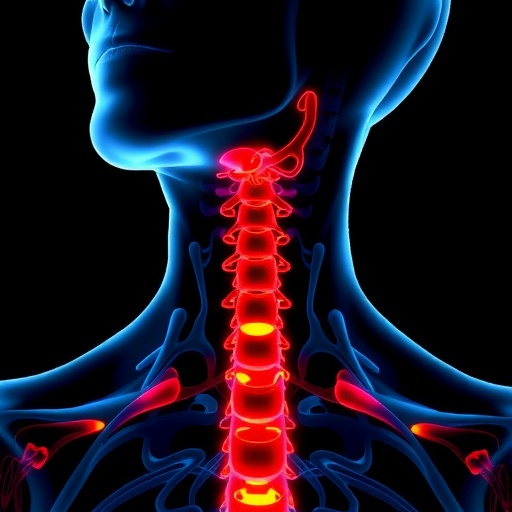In the pursuit of understanding autoimmune diseases, researchers have continuously investigated the intricate mechanisms that underlie these conditions and their potential markers. One such disease, Hashimoto’s thyroiditis, has garnered attention due to its complexity and increasing prevalence over recent years. A recent study sheds light on an intriguing aspect of this autoimmune disorder by exploring the significance of specific serum biomarkers, namely CA 19-9 and CA 72-4. The findings have implications not only for diagnosing Hashimoto’s thyroiditis but also for potential management strategies.
Hashimoto’s thyroiditis, an autoimmune condition primarily affecting the thyroid gland, leads to inflammation and destruction of thyroid cells. It poses a significant risk for patients, as it can lead to hypothyroidism and other long-term health complications. The diagnosis of this condition has traditionally relied on a combination of clinical evaluations and thyroid function tests. However, the search for reliable biomarkers has sparked interest among the clinical and research communities alike. Understanding the role of serum markers could provide new avenues for early diagnosis and monitoring of disease progression.
The recent prospective case-control study, published in BMC Endocrine Disorders, meticulously investigates the levels of CA 19-9 and CA 72-4 in patients diagnosed with Hashimoto’s thyroiditis. These markers are classically associated with pancreatic and gastric cancers, respectively, but emerging evidence suggests that they might also play a crucial role in thyroid pathology. Such a perspective transitions the view of these markers from strictly oncological parameters to potential players in autoimmune mechanism insights.
In this study, the research team led by Demirci and colleagues conducted a detailed assessment of serum biomarker levels in a well-defined cohort. These cohorts consisted of patients with confirmed Hashimoto’s thyroiditis and healthy controls. The methodology utilized provided a comprehensive framework to examine not only the serum levels of CA 19-9 and CA 72-4 but also their correlation with various thyroid function tests and clinical data, thus allowing for a broader spectrum of understanding the pathophysiological processes involved in Hashimoto’s thyroiditis.
According to the authors, the significance of the findings centers on the variability of CA 19-9 and CA 72-4 levels noted among patients with Hashimoto’s compared to healthy individuals. The elevated levels of these markers in affected individuals may reflect underlying inflammatory processes and suggest a more systemic involvement of autoimmune mechanisms. This is particularly critical as current understanding emphasizes a multi-faceted nature of autoimmune responses, where inflammatory cytokines and other mediators play pivotal roles alongside established thyroid markers.
Moreover, the implications of these elevated biomarker levels extend beyond mere diagnostic measures. They may provide insights into the disease’s progression and its responsiveness to treatment. If further validated in larger cohorts, these biomarkers could become instrumental in tailoring individualized therapeutic strategies for patients suffering from Hashimoto’s thyroiditis. The ability to predict which patients might experience more aggressive disease manifestations or require closer monitoring could advance patient care significantly.
The study’s design as a prospective case-control investigation strengthens the validity of its findings. By employing a robust statistical analysis and controlling for confounding factors, the researchers ensure that their conclusions about the abnormalities in CA 19-9 and CA 72-4 levels are both reliable and applicable to the broader population. This methodological rigor is crucial, as it lays the groundwork for future research that may explore not only these biomarkers but additional elements of thyroid autoimmunity.
The implications of these findings resonate beyond the immediate clinical setting. For researchers, they open new avenues for exploring the intersections of autoimmunity and biochemical markers, raising questions about whether other serum proteins exhibit similar patterns in various autoimmune diseases. Future studies may build on this work to conduct longitudinal analyses, investigating the fluctuation of these serum markers over time and their relationship with clinical outcomes.
As the medical community seeks to enhance the understanding of Hashimoto’s thyroiditis, this research underscores the vital role biomarkers may play in paving the way for better diagnosis, treatment, and prognosis standards. It emphasizes the need for a broader approach to autoimmune diseases, one that integrates clinical insights with biochemical markers to refine how such conditions are understood and managed.
Ultimately, this study exemplifies the dynamic nature of medical research, where classic markers previously associated with malignancies are now being reevaluated in the context of autoimmune disorders. As researchers continue to unravel the complexities of Hashimoto’s thyroiditis, this work stands as a testament to the potential for integrating diverse scientific knowledge into clinical practice. The ambition to optimize treatment approaches exemplifies the overarching goal of advancing patient-centered care amidst the challenges presented by autoimmune diseases.
In conclusion, the study by Demirci et al. not only highlights significant findings related to serum CA 19-9 and CA 72-4 levels but also serves as a call to action for continued exploration and innovation in the field of thyroid autoimmunity. As we move forward, embracing such integrative research could illuminate new pathways for understanding and effectively addressing the myriad challenges posed by autoimmune conditions like Hashimoto’s thyroiditis.
Subject of Research: Serum CA 19-9 and CA 72-4 levels in Hashimoto’s thyroiditis
Article Title: Serum CA 19 − 9 and CA 72 − 4 levels in hashimoto’s thyroiditis: a prospective case-control study
Article References:
Demirci, H., Ucgul, E., Aydogan, E. et al. Serum CA 19 − 9 and CA 72 − 4 levels in hashimoto’s thyroiditis: a prospective case-control study.
BMC Endocr Disord 25, 217 (2025). https://doi.org/10.1186/s12902-025-02037-5
Image Credits: AI Generated
DOI: 10.1186/s12902-025-02037-5
Keywords: Hashimoto’s thyroiditis, CA 19-9, CA 72-4, autoimmune disease, biomarkers, thyroid function, thyroid pathology.
Tags: autoimmune disease management strategiesautoimmune thyroid disease researchCA 19-9 serum levelsCA 72-4 in autoimmune disordersclinical evaluations for Hashimoto’searly diagnosis of Hashimoto’sHashimoto’s thyroiditis biomarkershypothyroidism risk factorsimplications of serum markers in thyroid diseaseprospective case-control study on thyroiditisthyroid function tests and biomarkersthyroid inflammation and damage





